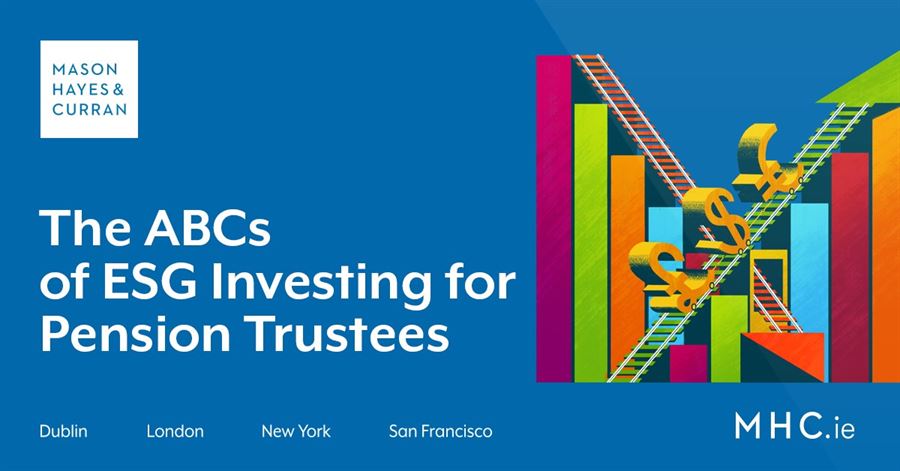
In the past, it was thought that investing on the basis of environmental, social and governance (ESG) issues was off limits for trustees as it conflicted with their duty to invest in their members’ best financial interests. This argument has become difficult to maintain, as the public importance attached to climate change, employee rights and corporate social responsibility has gathered significant momentum in recent years.
ESG factors are no longer isolated issues, unconnected with a company’s financial performance. Much of the recent analysis has found that poor ESG scoring companies now struggle to perform financially as well.
The IORP II Directive (Directive) makes specific reference to the consideration of ESG factors by trustees when considering investments and the EU (Occupational Pension Schemes) Regulations 2021 (Regulations) do not deviate from the Directive in this respect. As well as the Regulations, the Sustainable Finance Disclosure Regulations 2021 (SFDR) became effective earlier this year and impose obligatory disclosure obligations on financial market participants, including pension schemes, for the sustainable aspects of their investment strategies.
The importance attributed to ESG factors
Both individual and institutional investors have become gradually more focused on the ESG impact of stocks and it is now common for investors to pursue financial returns which are linked to positive effects on environment and social issues. As a link between ESG scores and financial performance has been established, it has become essential for trustees to consider ESG factors when making investment decisions. Conversely, companies that are low scoring on ESG factors are seen to be at risk of driving away investment and more likely to find themselves at the centre of a media storm when an incident spotlights their behaviours.
Regulatory requirements
The Regulations provide that trustees must invest in accordance with the ‘prudent person’ rule within the meaning of the Directive. Essentially, this means that speculative or risky investments must be avoided and investment policy must be geared to the membership structure. The Regulations also require that scheme resources must be invested in accordance with the long-term interests of its members. They also state that trustees may take into account the long-term impact of investment decisions on ESG factors.
Trustee will need to consider the long-term consequences of investing in traded companies that are associated with activity that is considered to be unethical, immoral or a public health issue. Trustees will also need to be wary of investment in industries that are likely to see increasing regulation, higher taxes and decreasing popularity with consumers.
Here to stay
For any market participant that has ignored the development of this area over the past number of years, it becomes apparent from even a cursory glance at EU legislation that change is rapidly occurring. In 2017, the EU Non-Financial Reporting Directive 2014 (Reporting Directive) was transposed into Irish law. The Reporting Directive requires companies of a certain scale to disclose information about their activities that impact on the environment, social issues, employee matters and human rights.
In March of this year, the European Commission adopted a report (Report) and draft directive relating to supply chain due diligence and accountability when it comes to human rights, climate change and other issues. The stated aim of the Report is to better align the interests of companies, their shareholders, managers, stakeholders and society.
The revised Shareholders’ Rights Directive 2017/828 has also been transposed into Irish law by the European Union (Shareholders’ Rights) Regulations 2020 (Shareholder Regulations). The Shareholder Regulations require institutional investors, including pension schemes, to develop and disclose an engagement policy which provides information on their behaviour as a shareholder in publicly traded companies.
Increasing risk of litigation
The ever increasing level of regulation and corporate accountability in this area will undoubtedly see a rise in the number of claims taken by stakeholders against companies or asset managers and we may even see litigation involving pension trustees where ESG factors were ignored or did not form a part of their investment strategy.
Conclusion
While trustees must base their investment decisions on financial performance, it is also increasingly clear that trustees cannot ignore the importance that is being attributed to ESG factors both from a regulatory and a financial perspective. Trustees and employers should review scheme governing documentation and assess how ESG investing fits within existing trustee powers and obligations. An ESG policy should also be put in place for all schemes. Where there is doubt as to what the regulatory requirements are around ESG investing, legal advice should be sought.
For more information on incorporating ESG factors as part of your scheme’s long-term investment strategy, contact a member of Pensions.
The content of this article is provided for information purposes only and does not constitute legal or other advice.







